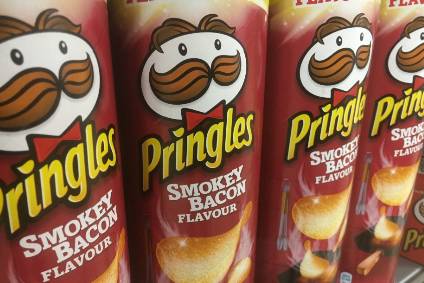
Kellogg argues the world’s major FMCG companies need to change the way they approach – and resource – e-commerce to capitalise on the growth in the channel.
Julie Bowerman, Kellogg’s chief global digital consumer and customer experience officer, told an industry conference today (6 November) large FMCG groups can err in the way they set up for e-commerce and in how they invest in the channel.

Discover B2B Marketing That Performs
Combine business intelligence and editorial excellence to reach engaged professionals across 36 leading media platforms.
“The mistake that FMCGs can make sometimes is checking the digital box,” Bowerman, a former Coca-Cola Co. and Hain Celestial executive, said at the IGD Live event in London. “By applying brick-and-mortar ways online, investing in e-commerce based on its current scale and not thinking about it that long term, and fragmenting digital responsibilities across functions and not thinking about it integrated. This is what I’ve often referenced internally in those companies, [saying] ‘We’re just checking the box right now, we’re not really leading in digital.'”
Bowerman, who joined Kellogg in February after two years at Hain and two decades at Coca-Cola, said the competition large companies were facing from smaller “digital-first” brands meant “big FMCG” had to act. “They’re standing up their business online in a matter of weeks, and they’re attracting consumer eyeballs and commanding sales and stealing share of stomach from us. And so, to compete with them, we have to be digital-first. We have to think like they do and act like they do.”
The “ambitions” of pure-play e-commerce retailers like Amazon and Alibaba, the changes in the way consumers are shopping – driven by trends such as convenience – and the developments in the media landscape were also reasons why major consumer-goods companies had to look again at the way they approach e-commerce, Bowerman argued.
“When you have scale, it’s difficult to adapt. You can’t be agile and nimble and it’s hard to think iteratively when you have scale and infrastructure and legacy systems and processes that support that scale,” Bowerman acknowledged.

US Tariffs are shifting - will you react or anticipate?
Don’t let policy changes catch you off guard. Stay proactive with real-time data and expert analysis.
By GlobalData“Ecommerce and digital is a long term game. You build it over time and you have to often invest ahead of scale. When we’re feeling short term pressures – and we’ve talked a little bit about this morning, particularly in this market – it’s hard to be investing in longer term. And our categories are highly fragmented now.”
Bowerman said Kellogg, the owner of brands from Special K to RXBar snack bars, was developing a “hybrid” approach of acting like a smaller, “digitally-native” brand and leaning on the scale of one of the largest companies in the food industry.
“Digitally-native brands hire talent differently. They’re very technology driven, they’re direct marketers, and they think very digital, very quick and agile. At Kellogg, we’re building a hybrid approach. You have to respect your heritage, your legacy, your scale, your processes – but to compete, you have to think like the digitally-native brands.”
Bowerman said Kellogg viewed e-commerce as a “platform that both builds brands and drive transactions”, adding: “One of the mistakes that I’ve seen in some of the previous companies I’ve worked for is that oftentimes ecommerce is put in the sales organisation or the marketing organisation. It’s both.”
She explained how Kellogg its “digital team” thinking about how to serve shoppers, consumers and customers. “Oftentimes consumer sits in brand, shopper sits somewhere in the commercial organisation and customer sits in sales. We’ve brought those together into one digital organisation, we’re integrating and again building capabilities in the way that the external universe, actually, behaves. That’s how shoppers behave, that’s how customers want us to act. We’re building that in an integrated way.”
While Kellogg does not disclose specific numbers for its sales through e-commerce, Bowerman said the company had set “ambitious metrics”.
She said: “Our goal is to have accretive economics. Many, many brands and retailers talk about how the online channel can be dilutive. Our ambition is to be accretive.
“We want to lead in the categories that we’re participating. We don’t want to lag. And we want to be growing at the pace of the channel in a particular market. I think most important to this is that we’ve integrated these metrics into the P&L routines of the organisation. The general managers across different markets track the e-commerce performance, just as they would every other performance.”





